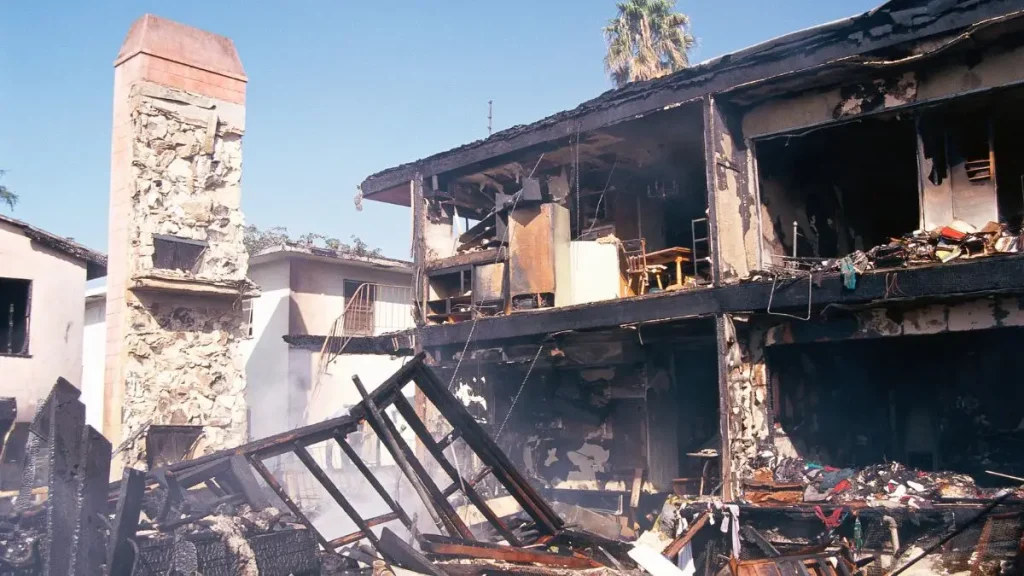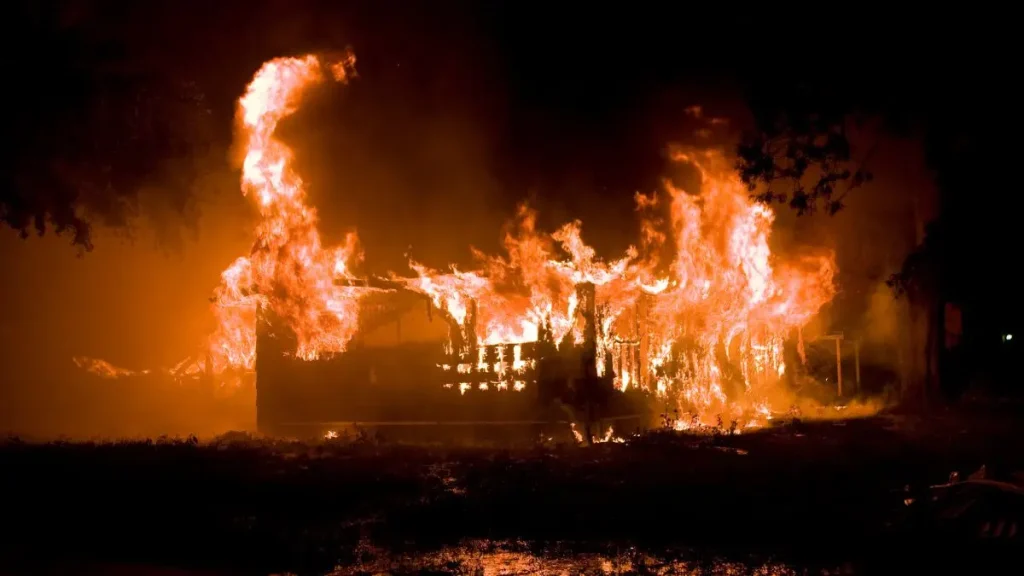Pensacola Firefighters Respond to Home Fire After Electrical Problem Displaces Two
I’ve seen enough fire reports over the years to know when something feels all too close to home. On Monday morning, around 10:45 a.m., a fire broke out at a single-story, wood-framed house on W. Lee Street in Escambia County.
From what officials shared, heavy smoke and flames were already tearing through the back section of the home by the time firefighters arrived. Crews from Escambia County Fire Rescue — with help from the Pensacola Fire Department — were able to knock it down by 11:16 a.m.
No one was hurt, thankfully. But the damage tells its own story: a back corner of the house was burned, and smoke pushed through nearly every room. The kind of damage that makes a place unlivable — even if the walls are still standing.
Two people lived there. They’re safe, but displaced. The American Red Cross stepped in with temporary housing, which is often the lifeline in moments like this.
This wasn’t some big, dramatic explosion you see on the news. It was an ordinary home, on an ordinary street. That’s what makes it hit harder.
Have you ever thought about how quickly your own home could become unlivable? Let’s talk about that in the next section — and what caused this fire in the first place.
What Caused the Fire? Inside the Electrical Fault Issue
I’ve covered plenty of fire stories, but there’s a pattern that always unsettles me — how often it all starts with something behind the walls. That’s what happened here.
According to WEAR-TV’s report, officials say the fire at the W. Lee Street home began due to an electrical issue inside the house. That could mean faulty wiring, an overloaded circuit, or even an old outlet finally giving out.
You might not think twice when a breaker trips or when a plug sparks for a second — but those little signs? They’re warnings.
If your home is older, or you’ve been using the same outlets and cords for years without inspection, this is your wake-up call. I’m not saying panic — I’m saying pay attention before you end up standing outside watching everything go up in smoke.
Just earlier this year, a 73-year-old man tragically lost his life in an early morning house fire in Ohio — another reminder that fire safety has no margin for delay.
Damage Report – What Happened to the Home & Residents

I want to walk you through what the fire did — not because it’s sensational, but because you need to picture the kind of disruption a fire like this can bring.
Most of the visible damage was concentrated in the back-left section of the home. But smoke doesn’t respect boundaries. It moved through the structure fast, blackening walls and ceilings, soaking into everything soft — clothes, mattresses, curtains, even the drywall.
For the two people who lived there, it meant losing more than just shelter. They lost routine. They lost their space.
You might wonder what happens next for people in that situation. Thankfully, the American Red Cross responded quickly and offered temporary housing assistance. They do this often — but it’s a sign of how fragile stability can be.
Could you pick up and leave your home tomorrow with only a few minutes’ notice? That’s what they had to do.
Sadly, not every fire story ends without tragedy — like in this case where a father and daughter lost their lives in a Washington house fire, reminding us how fast these situations can turn deadly.
How to Prevent an Electrical Fire in Your Own Home?
Now I’ll be honest with you — no one thinks they’ll be the next house on fire until it’s too late. But prevention isn’t about fear. It’s about smart habits.
If your lights flicker when you turn on the microwave, or you smell something odd from an outlet? Don’t shrug it off.
If you’re using extension cords as permanent solutions or plugging multiple heat-producing devices into the same strip — stop.
Here’s what I recommend you check this week:
- Wiring: If your home is over 20 years old, get a licensed electrician to inspect.
- Outlets: Warm or discolored outlets? That’s a red flag.
- Breakers: Frequent trips aren’t just annoying — they’re telling you something.
- Power strips: Never plug heaters or high-wattage items into them.
- Smoke detectors: Check every month. Replace batteries every 6 months.
You don’t have to be an expert. You just have to care enough to act before the sparks become something worse.
Many locals have started discussing home safety and real-time incidents through WhatsApp alerts — it’s one way people stay aware of risks like this in real time.
Escambia’s Electrical Fire Pattern – Is This a One-Off or a Warning?
Let me tell you — this isn’t the first electrical fire in Escambia County this year, and sadly, it likely won’t be the last.
Back in late 2023, there was another blaze in a nearby neighborhood also caused by faulty wiring. No injuries, but that home was destroyed. Sound familiar?
You and I both know many homes in this area are older — wood-framed, with aging electrical setups that haven’t seen upgrades in years. And every time a new fire happens, it’s a reminder that we’ve got an invisible threat hiding in our walls.
So here’s a question for all of us living in this region:
Are we waiting for tragedy to strike before we act? Or are we willing to spend a little time and money on safety before the damage becomes irreversible?
Because what happened on W. Lee Street isn’t isolated. It’s part of a pattern we can no longer afford to ignore.
Similar scenes have unfolded elsewhere too — like a Cleveland home fire that displaced seven people and involved emergency animal rescues.
What to Do If You’re Displaced by a Home Fire?

I hope you never have to face what those two residents just went through. But if you do — or if someone you care about does — knowing what steps to take can make the road back a little less overwhelming.
Here’s what I want you to remember:
- Step 1: Call 911 and get to safety. Everything else comes after that.
- Step 2: Contact local emergency support. In Pensacola, the American Red Cross is usually first to respond for housing and essentials.
- Step 3: Document the damage. Take photos if it’s safe, note timelines, and keep any official paperwork.
- Step 4: Notify your landlord or insurance provider. The sooner you start a claim or report the incident, the faster recovery begins.
- Step 5: Seek community support. Churches, local nonprofits, and neighbors often step up to help — especially in Escambia.
And you don’t have to navigate it alone. The Red Cross, your fire department, and even online community groups in Pensacola have helped dozens through situations like this.
You deserve support — and you’re not alone.
Have you ever experienced or witnessed a similar situation in your area? Share your thoughts or tips in the comments — your voice matters here.
Key Takeaways for Pensacola Homeowners & Renters
In case you’re skimming, or you want to share this with someone — here’s what truly matters from this story:
- A home fire broke out on W. Lee Street due to an electrical issue
- Two residents were displaced, but no one was injured
- The American Red Cross stepped in with temporary housing
- You can protect your own home by getting wiring inspected, updating smoke alarms, and using appliances safely
- Fire threats in Escambia aren’t rare — but they’re preventable
If nothing else, use this story as a push to walk through your home today and ask:
Is everything as safe as it looks?
Final Thoughts
You don’t get a warning when something sparks behind the wall. You only get the aftermath — and the choices you made before.
The folks on W. Lee Street didn’t expect their day to end without a home. But now, their experience gives the rest of us a chance to think ahead.
So whether you own, rent, or just live in an older building — take this story as a sign to do one small thing safer this week.
That’s how you protect what matters.
For more real stories and safety updates like this, Visit our website Build Like New — stay informed, stay prepared.
Disclaimer: This article is based on publicly available news reports and statements. It is intended for informational purposes only and should not be considered legal, electrical, or emergency guidance. For fire safety inspections or legal assistance, please consult licensed professionals in your area.


